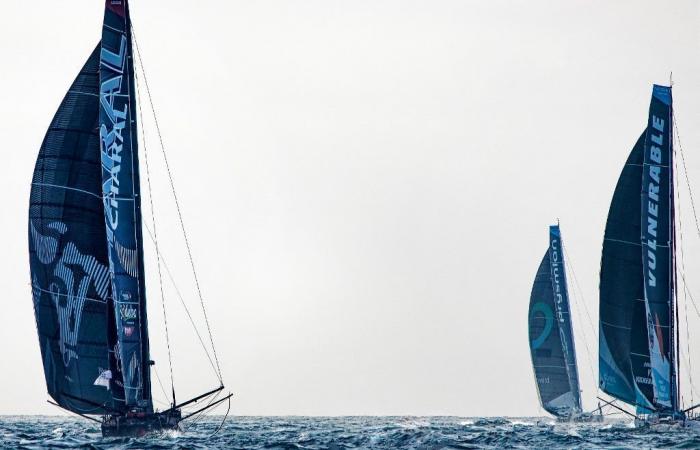“The earth is silent, and the ocean speaks” sang Michelet, adding “he speaks to distant stars. It is mainly aimed at men. As it is the fertile crucible where creation began and continues in its power, it has its living eloquence; it is life that speaks to life. » The sailors embarking on the Vendée Globe from Les Sables-d'Olonne will perhaps have this voice of the sea in mind. The competition is undoubtedly the distant heir of the initiatory journeys of the Odyssey or the Irish imrama.
Since its creation in 1989, one of the most famous races in the world has been filled with exploits but also drama that has transformed it into an epic. The call of the sea is a mixture of extraordinary bravery, indifference to risk, solidarity, surpassing oneself and desire for freedom. Since the 15th century, France has bred sailors with exceptional destinies, from the first explorers to sea runners. Faced with the unpredictable, they sublimated this nature by crossing it and fascinated contemporary generations who have lost the taste for adventure. The sea is more than a horizon, it is the last refuge of heroism. It allowed France to give the best of itself.
The first sailors, in search of fabulous discoveries, had the impression, often well-founded, of sailing towards the unknown. They apprehend a labyrinthine universe subject to natural and supernatural forces haunted by mermaids and ghost ships. A contrary wind, raging waves, uncertain currents, an obstructed star, an epidemic on board, are all curses to be exorcised. We must resort to the divine, as the Argonauts' mast whispers advice to overcome danger.
No danger dampens the enthusiasm of sailors struggling to escape deadly reefs
A dose of unconsciousness or self-confidence is essential to dare to take to the sea when popular belief thought that ships would burn when crossing the Equator if they had not yet been engulfed by biblical monsters. Each course doubled, each strait crossed is a baptismal crossing, a victory over fear. And yet, Vasco da Gama, Columbus or Magellan did not hesitate to undertake a perilous circumnavigation.
Big French names
Deep-sea shipping is also French. Basque, Breton and Norman fishermen took France to the archipelagos at the end of the world, opening the horizon to the expeditions of Jacques Cartier in Canada, Gonneville in Brazil, Verrazano in North America or Parmentier as far as Madagascar. Danger is everywhere at sea but far from dissuading travel, it increases filibustering. The Malouins Duguay-Trouin and Surcouf, the Dunkirk Jean Bart, after La Barbinais, Forbin and before the Nantais Cassard offer the French race its letters of nobility.
The rest after this ad
The Pacific and Indian oceans are traversed by the glories of the French navy. Beauchesne discovers the Falklands, Bougainville approaches Tahiti and the Moluccas, Surville takes us to New Zealand where Dufresne is massacred by the Maoris while Kerguelen touches Antarctica. Aboard the Astrolabe and the Boussole, La Pérouse launched the largest expedition ever financed before disappearing off the coast of New Zealand in 1788. The mystery of his disappearance remains unsolved. Dumont d'Urville, who went looking for him, Doudart de Lagrée, Houst, and Savorgnan de Brazza in China and Africa, and especially Charcot in Antarctica, pushed the limits of the known world and nourished a Vernian imagination which delighted schoolchildren. The French ambition for the poles was taken up by the explorers Paul-Émile Victor, of Swiss origin, and Jean-Louis Étienne.
This maritime tradition will no longer be denied. Éric Tabarly writes the name of his boat, the Pen Duick, in the legend, inspiring Olivier de Kersauson. Isabelle Autissier, at the helm of a boat she built, is sailing around the world. If the Route du Rhum makes Florence Arthaud triumph, it carries Alain Colas in its waves. The areas are better known but the risk remains when the 13 sailors of the 1st Vendée Globe set off in a solo, non-stop and without support regatta. The rescue of Philippe Poupon by Loïck Peyron establishes the legend of the event. It also turns into tragedy. If many survivors owe their lives only to the solidarity of competitors, Mike Plant, Nigel Burgess, Gerry Roufs lie for eternity in the depths of the oceans.
Victory on the water always means returning safely
No danger dampens the enthusiasm of the sailors who struggle to escape the deadly reefs, injuries and hunger that constantly plague them. The Vendée Globe still resonates with the exploits of Titouan Lamazou, Michel Desjoyeaux, Philippe Poupon, the young François Gabart and his rival Armel Le Cléac'h. Yannick Bestaven snatches the victory from Charlie Dalin, who was the first to arrive, due to his help in the recovery of Escoffier by the lively Jean Le Cam. The myth has its heroes.
By sailing, we confront ourselves with something greater than ourselves with this feeling of humility in the face of the maritime immensity, marked by imagination, which inclines us to come to terms with nature. The sea frees us from the servitudes of the land to listen to the song of the sea. But to conquer on the water is always to return safely. The solitary escape at sea from which almost all cosmogonies proceed is a return to oneself. This unstable world helps us thus, “against all odds”to stay the course, like Ulysses, to find ourselves.






